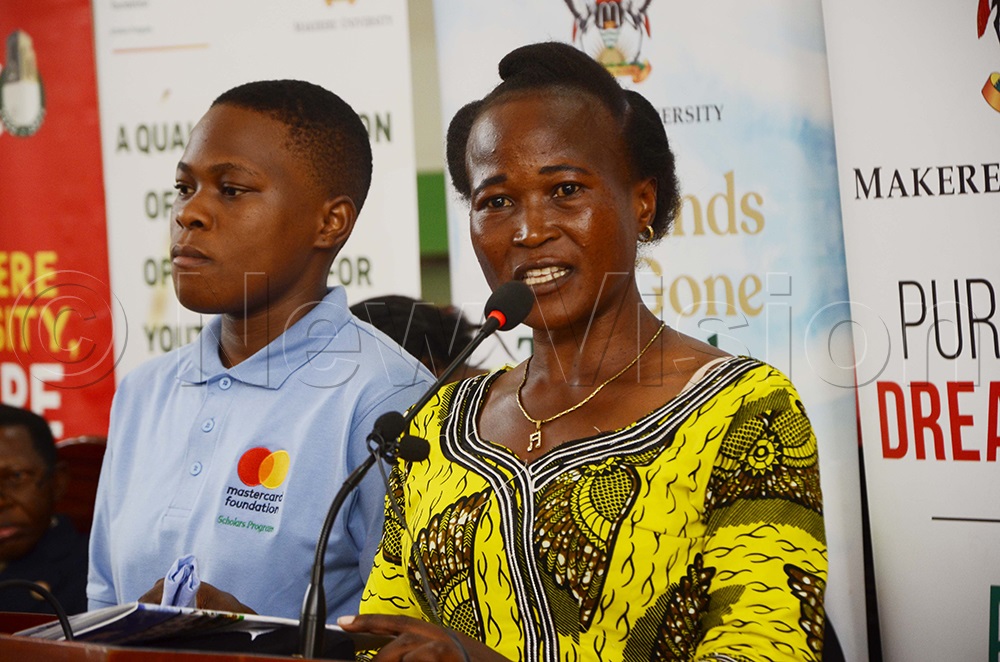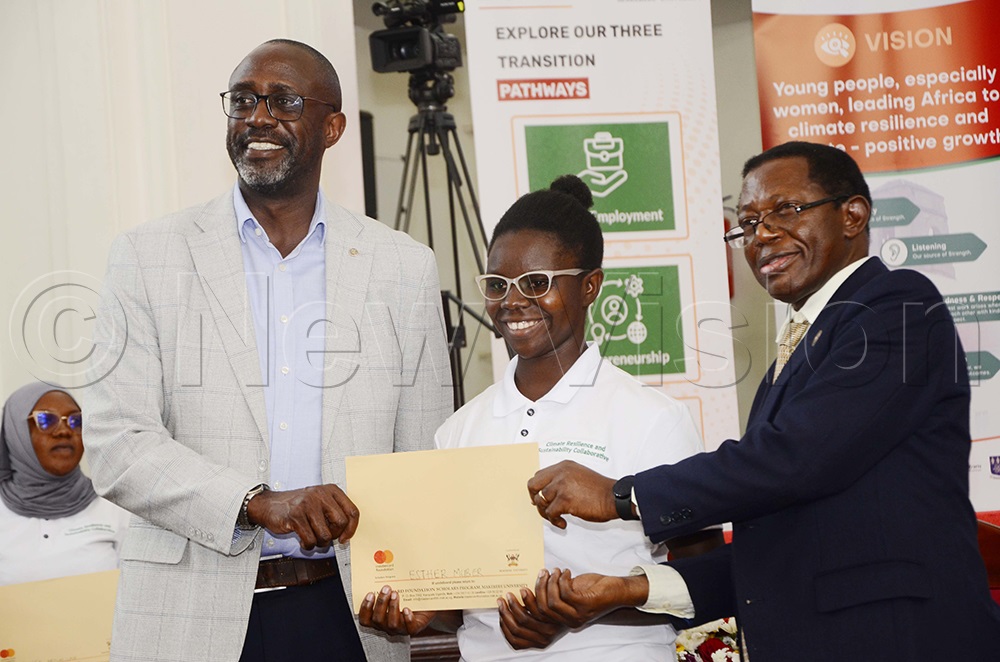Rising hunger for higher education, shrinking opportunities for Ugandans
At Makerere University alone, over 1,000 students abandon their studies annually due to financial strain.
Adrian Bukenya (second left), Mastercard Foundation Uganda country director, Prof. Buyinza Mukadasi (second right), Deputy VC, Prof. Justine Namaalwa Jjumba (right), programme Director, pose for a photo with beneficiaries during the scholarship award ceremony at Makerere University on September 11, 2025. (Photo by Juliet Kasirye)
_______________
“Life is so difficult; I’m struggling to get food, yet no school fees for these children,” a 40-year-old single mother of eight, Agnes Nakayenga, from Kiboga district, says.
For years, she clung to the hope that her children might escape poverty through education, a hope that briefly brightened when her eldest daughter, Peninnah Nakitende, secured a fully funded scholarship.
“If it wasn’t for this opportunity, she would never have gone to school. I was so excited the day she called,” Nakayenga says, her voice trembling with relief. Yet, her story mirrors a broader crisis in Uganda, where soaring demand for higher education collides with dwindling resources and opportunities.
Agnes Nakayenga, from Kiboga district, addressing parents as her daughter looks on during the scholarship award ceremony at Makerere University. (Photo by Juliet Kasirye)
Peninnah’s journey epitomises the struggle. From primary school, she relied on partial scholarships while her mother toiled in gardens, borrowed money, and endured shame over unpaid debts.
“My mother is everything,” Peninnah says, her voice soft but resolute. But her success is rare. This year, over 2,500 undergraduates applied for Mastercard Foundation scholarships, but only 194 were selected. At the postgraduate level, fewer than 2% of applicants secured support.
At the postgraduate level, the situation was even more competitive. 784 students applied for master’s scholarships, but only 12 succeeded. The process saw 268 admitted at Makerere, 64 shortlisted for interviews, 28 cleared for home validation, and finally 12 awarded scholarships.
The numbers indicate that thousands of Ugandan students are being left behind.
At Makerere University alone, over 1,000 students abandon their studies annually due to financial strain.
“The demand for tertiary education is increasing, yet the resources are not there,” Makerere’s academic registrar Prof. Mukadasi Buyinza says, urging organisations to step in.
The latest scholarship cohort, announced at Makerere, included students from 67 Ugandan districts, 17 refugee settlements, and five African nations. Vulnerable groups such as refugees (45 scholars), persons with disabilities (22), and minority tribes (10) were prioritised. Still, for every success story like Peninnah’s, countless others linger in uncertainty.
Agnes’s story remains bittersweet. While one daughter found a path, her seven other children await their turn. “I pray one day all of them will study. Education is the only gift I want for my children,” she says.
Scholarship programmes, though life-changing, are a drop in the ocean.
Mastercard Foundation country director commended Makerere University for agreeing to partner with them. Though he challenged beneficiaries to seize opportunities with transparency. This was during the scholarship handover ceremony in early September 2025.

Adrian Bukenya, Mastercard Foundation Uganda country director hands over the scholarship award to Esther Muber as Prof. Buyinza Mukadasi, Deputy VC academic affairs look on during the scholarship award ceremony at Makerere University on September 11, 2025. (Photo by Juliet Kasirye)
“You are among the few ones that have got this opportunity; respect it,” he said. He added, “Do your part to create many other opportunities for others.”
Earlier statistics
Makerere University alone has been facing troubling student dropout rates. Each year, over 1,000 students are forced to abandon their studies, with the majority citing financial difficulties as the main reason. Many students struggle to raise tuition fees and other associated costs, leading them to discontinue their academic journey before completion. University administrators have expressed concern that this trend undermines the institution’s efforts to produce skilled graduates. While efforts such as scholarships and government sponsorship exist, they remain insufficient to cover the growing number of students in need.